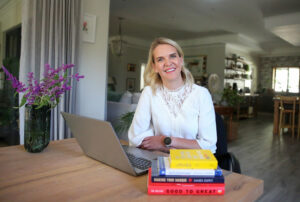Want to work from home for companies overseas? Have you ever thought of freelancing? Ubuntu Freelancers has tapped into this gateway, connecting hard working South Africans with overseas clients who are looking to outsource various roles in their business, working from home.
How it started

Behind this amazing idea is the powerhouse woman of Di Luden. Di spent a good deal of her time working aboard the Superyachts in the Mediterranean. At the age of 35, she came back to SA. Her family was in Grahamstown but she was drawn to PE, working for Adrian Gardener in a charity capacity. When Covid hit, and she saw a friend of hers being successful travelling and working, she knew she had to give this a go. She started working for someone that she had already worked with on the yachts, and that was the birth of this kind of remote employment.
She started the business with her cousin, Ryan, while still working full time, in 2021. Initially they worked by placing one freelancer per client at a time, but soon realized this was unrealistic as clients have different needs and they needed to build up a bank of freelancers in order to always be able to offer the right freelancer to the right client. This process has led to currently have 45 freelancers in their team, and this number is growing every day.
The recruitment process
- You go onto their website and fill in the contact form.
- You’ll then get an email explaining a little bit about how they work. They have discovered that it’s not ideal to do this alongside a full time job, because of the availability factor for clients.
- The first step is to find out basic information about you. They will ask for your CV, your internet speed, confirmation of alternative power supply, and a quiet place to work.
- In the second step you send a video explaining which category you are interested in and where your skills align.

- The third step is the interview with Ryan, who is Di’s partner, and he will also explain more on how the process works. It isn’t a guarantee of a job, it’s adding to their bank of professionals until something becomes available. It’s also your chance to ask questions.
- The fourth stage is taking some skill tests. You’ll do some short projects for them.
- Once that is done, your profile will be created.
- There are levels of pay, depending on your skill and experience. Some clients want experts and others are happy to train for a lower rate.
- When you will get a job depends on the availability, it might be the same day or it might be a month later.
Categories of work that they recruit for:

- Virtual Assistants: “Anything administrative support, it can also mean customer service, transcription.”
- Bookkeeping: Because tax and other rules are quite different in different countries, this is more like “plugging things into Sage, Quickbooks, very basic bookkeeping.”
- Digital Media: “Copywriting, web design, graphic design, technical writing, SEO, social media management, anything within that space.”
Creating community amongst her freelancers

They use Slack for communication. They have different boards, one for chat, another for notices. Di also has a weekly schedule to make sure that her freelancers are valued and supported:
Mondays – community chat, where they often do a tutorial on something trending in the industry, or a topic that has been asked a lot during the week by the freelancers. Every second Monday they host a Water Cooler session, this a time for all freelancers to join and simply chat about anything they wish to.
On Wednesdays they host a “Mentor Moment”; freelancers can join this 1:1 session to ask any questions to either Di or Ryan and seek advice and help.
Caring for clients
Her clients are in the US and the UK. The UK has very similar hours to us, so it isn’t so much of a big difference in working hours. She has scheduled calls for them too.
For the US, they either work a later schedule from e.g. 2pm to 8pm – when the hours need to be full time like that – or it’s more flexible. When you wake up, your work has been emailed. Then when they wake up, it’s done. Then there is some overlap in their morning. There might be a sporadic instance when you have to be available late at night, but it’s not the norm.
Upwork course

Ubuntu Freelancers are also putting together a course on Upwork. Di says that Upwork also has an algorithm, so the more you show up and log in, the better your chances. I’ll link her course when it becomes live to this post. “This course will help guide you one step at a time on how to create a 5 Star Upwork profile and give you tips on how to secure your first client on the platform.”
Using Ubuntu Freelancers to hire workers

Potential clients would fill in the contact form on the Ubuntu Freelancers website. Di will set up a call with each of the potential clients to find out what their potential roadblocks are, how a freelancer could assist in their business, how many hours the clients anticipate the role to take and whether or not the hours are flexible. From there she will look at her database and then send 1-3 profiles to be interviewed. Then there will be contracts drawn up and the freelancers can get started almost right away. She tries and makes things as quick and simple as possible.
Success stories

The kind of reactions they have had from clients have been very positive. “Can we clone this person, they are brilliant,” they will say, or they will give an introduction to someone else.
One lady whose company closed overnight started working for one of their clients, a team of psychologists. She works full time in this position, but also has two other clients that she assists in the morning, before the US wakes up and her full-time job starts. “She is our biggest advocate,” says Di. “She has become more of a mentor than an employee for the one client and he literally says her input has been life changing in his business decision making.”
South Africans are hard workers that are prepared to put in the hours. In general she’s found that her freelancers go the distance and produce the results that keep her clients happy.
Some inspiration
Something interesting that Di shared with me, and what I would like to leave with you, is Patrick Lencioni’s analogy of what makes the ideal team player. These are characteristics that Di has worked hard to embody in her business and freelancers, and I think they are worth sharing.
A team player is:
- Someone who is humble, never takes full credit for something but rather realizes that the success is due to a team.
- Someone who is hungry to learn more, to do more, to be involved more.
- Someone who is smart – emotionally intelligent individuals who have common sense about people. They have good judgement and intuition about group situations.
Contact Ubuntu
Find Ubuntu Freelancers on their website, Instagram, Facebook and LinkedIn.



Leave a Reply